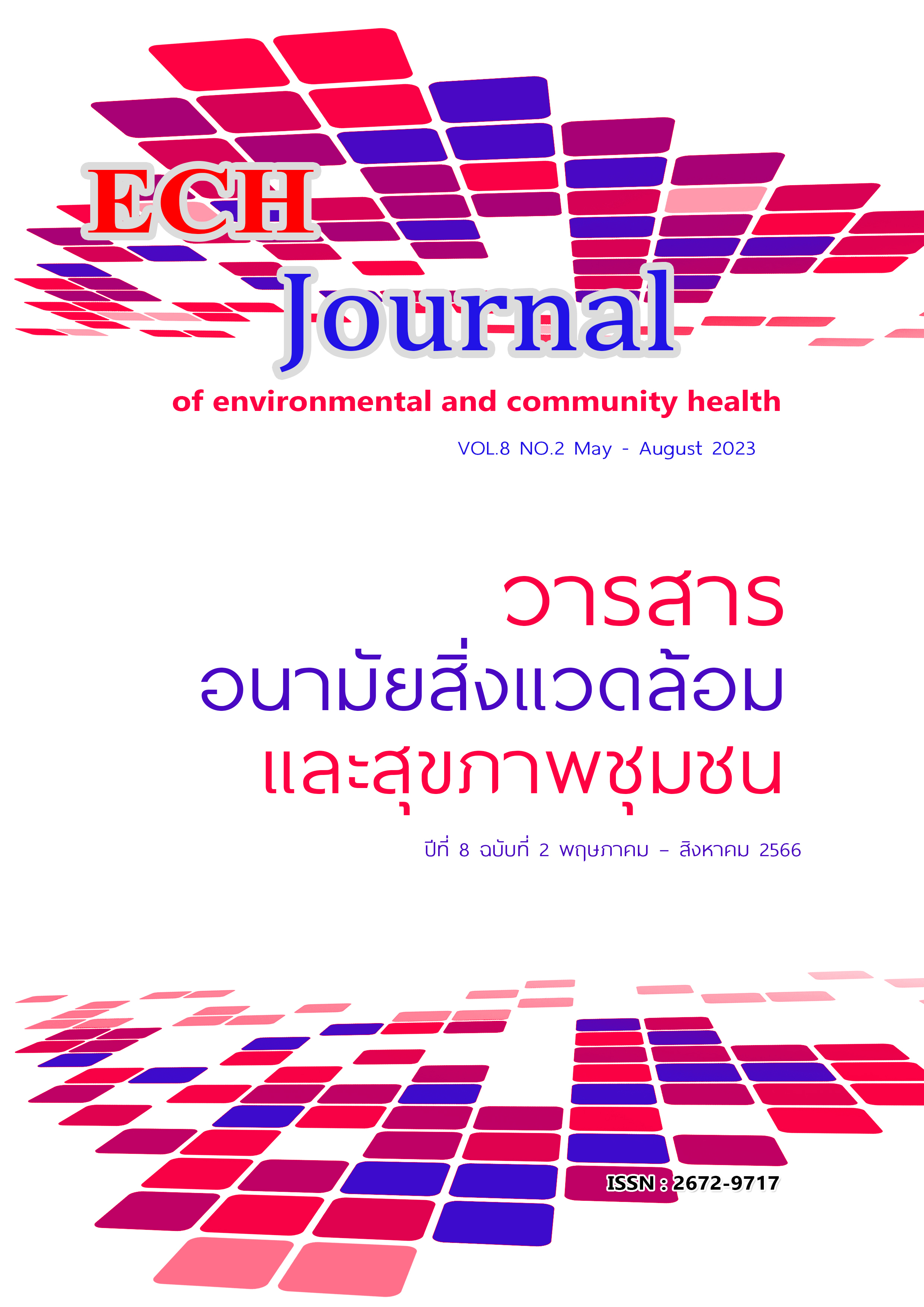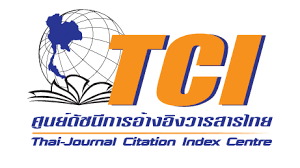ปัจจัยที่มีผลต่อพฤติกรรมความปลอดภัยในการใช้สารเคมีกำจัดศัตรูพืชของเกษตรกรผู้ปลูกผักและพืชสวนในตำบลบ้านกลาง อำเภอเมือง จังหวัดนครพนม
คำสำคัญ:
การใช้สารเคมีทางการเกษตร, พฤติกรรมความปลอดภัยบทคัดย่อ
การวิจัยนี้มีวัตถุประสงค์เพื่อศึกษาปัจจัยที่มีผลต่อพฤติกรรมความปลอดภัยในการใช้สารเคมีกำจัดศัตรูพืชของเกษตรกรผู้ปลูกผักและพืชสวน ออกแบบวิจัยแบบภาคตัดขวางเชิงวิเคราะห์ อาสาสมัครร่วมวิจัย 208 คน สุ่มตัวอย่างอย่างง่าย วิเคราะห์ข้อมูลด้วยสถิติเชิงพรรณนาเป็นจำนวนและร้อยละ ค่าเฉลี่ยและส่วนเบี่ยงเบนมาตรฐาน สถิติวิเคราะห์โดยวิธี step-wised multiple linear regression และการประมาณช่วงเชื่อมั่นที่ร้อยละ 95 กำหนดระดับนัยสำคัญที่ระดับ 0.05
ผลการวิจัยพบว่ากลุ่มตัวอย่างส่วนใหญ่เป็นเพศหญิงร้อยละ 68.8 สถานภาพสมรสร้อยละ 82.7 ระดับการศึกษาชั้นประถมศึกษาร้อยละ 66.8 มีพฤติกรรมความปลอดภัยจากการใช้สารเคมีในระดับดีแต่มีพฤติกรรมเสี่ยงจากการสวมหมวกโม่งหรือใช้ผ้าขาวม้าปิดปากปิดจมูกในขณะฉีดพ่น ผสมหรือใช้สารเคมีในระดับสูงร้อยละ 90 และพบว่าตัวแปรศึกษาร่วมกันทำนายพฤติกรรมความปลอดภัยได้ร้อยละ 58.4 โดยการรับรู้การกำกับพฤติกรรมตนเองเป็นตัวแปรที่ดีที่สุดในโมเดล รองลงมาได้แก่ การรับรู้บรรทัดฐานกลุ่ม ดังนั้นควรปรับเปลี่ยนพฤติกรรมการสวมหมวกโม่งและส่งเสริมพฤติกรรมความปลอดภัยในการใช้สารเคมีในเกษตรกรในระยะเร่งด่วนผ่านการพัฒนาการรับรู้การกับพฤติกรรมตนเองและสร้างบรรทัดฐานกลุ่ม ส่วนในระยะยาวควรสร้างการเรียนรู้เพื่อเปลี่ยนแปลงทัศนคติต่อการปฏิบัติพฤติกรรมความปลอดภัยเพื่อส่งเสริมการใช้สารเคมีทางการเกษตรที่ปลอดภัยอย่างยั่งยืนในพื้นที่ต่อไป
เอกสารอ้างอิง
The World Bank. Employment in agriculture (% of total employment) (modeled ILO estimate) [Internet]. 2023 [cited 2023 May 12]. Available from: https://data.worldbank.org/indicator/SL.AGR.EMPL.ZS
Marketeer. How many Thai farmers have? [Internet]. 2023. Available from: https://marketeeronline.co/archives/161682
Open Government Data of Thailand. import of agricultural hazardous substances (By type of use) [Internet]. 2023. Available from: https://data.go.th/dataset/importchemvol
Pimental, D. Amounts of Pesticides Rearching Target Pests: Environmental impacts and Ethics. J Agric Environ Ethics. 1995;8(1):17–29.
Damalas, A.C. & Koutroubas, D.S.. Farmers’ Exposure to Pesticides: Toxicity Types and Ways of Prevention. Toxics. 2016;4(1):2–10.
Basil, K.L., Vakil, C., Sanborn, M., Cole, D.C.. & et al. Cancer health effects of pesticides. Can Fam Physician. 2007;53(10):1–7.
Alavanja, M.C.R. & Borner, M. Occupational pesticide exposures and cancer risk. A review. J Toxicol Env Health B Crit Rev. 2012;15(4):238–63.
Robinson, D. Food biochemistry and nutritional value. Longman Sci Tech Publ. 1990;1:18–22.
Department of International Trade Promotion. Vegetables, fresh fruits, chilled, frozen and dried exports 2019 [Internet]. 2019 [cited 2026 May 12]. Available from: https://ditp.go.th › contents_attach PDF
Johnson, G.I., Weinberger, K., Wu, M.H. The vegetable industry in tropical Asia: an overview of proudction and trade, with a focus on Thailand, Indonesia, the Philippines, Vietnam, and India. Shanhua: The World Vegetable Center; 2008.
Anage, B.T. & Amikuzuno, J. Factors Influencing Pesticide Use in Smallholder Rice Production in Northern Ghana. Agric For Fish. 2015;4(2):77–82.
Teng, Y., Chen, X., Jin, Y., Yu, Z. & Guo, X. Influencing factors of and driving strategies for vegetable farmers’ green pesticide application behavior. Front Public Health. 2022;10(907788):1–13.
Li, L. & Guo, H. The impact of business relationships on safe production behavior by farmers: Evidence from China. Agribus Int J. 2019;35(1):84–96.
ณัฏฐ์กร ชื่นวัฒนพงศ์. ปัจจัยที่มีอิทธิพลต่อทัศนคติ และพฤติกรรมการซื้อผลิตภัณฑ์อาหารออร์แกนิค ของผู้บริโภคในกรุงเทพมหานคร [รายงานการค้นคว้าอิสระ กลักสูตรบริหารธุรกิจมหาบัณฑิต]. [กรุงเทพมหานคร]: มหาวิทยาลัยกรุงเทพ; 2060.
กองโรคจากการประกอบอาชีพและสิ่งแวดล้อมม กรมควบคุมโรค กระทรวงสาธารณสุข. รายงานสถานการณ์ การดำเนินงานเฝ้าระวัง ป้องกัน ควบคุมโรคและภัยสุขภาพ สำหรับแรงงานนอกระบบ ประจำปี 2563. นนทบุรี: กลุ่มพัฒนามาตรการ; 2563.
วิลาสิณี ทองบุ, พรนภา ศุกรเวทย์ศิริและสุนิสา ชายเกลี้ยง. ความชุกของพิษจากสารเคมีกำจัดศัตรูพืชในเกษตรกรจังหวัดร้อยเอ็ด : กรณีศึกษาพื้นที่โซนใต้. วารสารสาธารณสุขมหาวิทยาลัยบูรพา. 2560;12(2):41–52.
อภิมัณฑ์ สุวรรณราชและปัตพงษ์ เกษสมบูรณ์. พฤติกรรมการป้องกันตนเองจากอันตราย ในการใช้สารเคมีกาจัดศัตรูพืชของเกษตรกรในเขตพื้นที่รับผิดชอบโรงพยาบาลส่งเสริมสุขภาพ ตาบลบ้านเหมืองแบ่งตาบลหนองหญ้าปล้อง อาเภอวังสะพุง จังหวัดเลย. วารสารการพัฒนาสุขภาพชุมชน มหาวิทยาลัยขอนแก่น. 2558;3(3):395–407.
Armitage, J. & Conner, M. Efficacy of the Theory of Planned Behaviour: a meta-analytic review. Bristish J Psychol. 2001;40(4):471–99.
Ajzen, I. Constructing a theory of planned behavior questionnaires [Internet]. 2010 [cited 2022 Feb 12]. Available from: https://people.umass.edu/aizen/pdf/tpb.measurement.pdf
Zohar, D. Thirty years of safety climate research: Reflections and future directions. Accid Anal Prev. 2010;42:1517–22.
Teera Kangkhetkron & Chudchawal Juntarawijit. Factors influencing Practice of Pesticide Use and AcuteHealth symptomes among Farmers in NakhonSawan,Thailand. Int J Environ Res Public Health. 2021;18(8803):1–12.
Ratana Sapbamrer & Ajchamon Thammachai. Factors affecting use of personal protective equipment and pesticide safety practices: A systematic review. Environ Res. 2022;185:109444.
Pan, D., He, M., & Kong, F. Risk attitude, risk perception, and farmers’ pesticide application behavior in China: A moderation and mediation model. J Clean Prod. 2020;276(124241).
ศรีสุรางค์ เคหะนาค1, อิทธิพล ดวงจินดา, ณัฏฐ์อริญ เดชะศิริพงษ์และธินกร ไฝเพชร. ปัจจัยที่มีผลต่อพฤติกรรมการป้องกันตนเองจากการได้รับอันตรายจากสารเคมีกาจัดศัตรูพืชของเกษตรกร. วารสารมหาวิทยาลัยนราธิวาสราชนครินทร์. 2565;14(3):1–21.
Wisutthananon, A, Chanprasit, C., Kaewthummanukul, T. & Suwannaprapisa, T. Effect of Integrated Safety Program on Safety Behaviors among Rice Farmers: A Quasi-Experimental Study. Pac Rim Int J Nurs Res. 2019;23(4):345–56.
Baydur, H.., Eser, E., Gundogan, N.E., Ayhan, E., Eser, S.. & et al. Psychological Determinants of Turkish Farmers’ Health and Safety Behaviors: An Application of the Extended Theory of Planned Behavior. Agric 2023. 2023;12(967):1–13.
Afshari, M., Poorolajal, J., Rezapur-Shahkolai, F., Assari, M.J. & Karimi-Shahanjarini, A. Which Factors Influence Farmers’ Use of Protective Measures During Pesticides Exposure? Workplace Health Saf. 2019;67(7):338–49.
Madaki, M.Y., Lehberger, M., Bavorova, M., Igbasan, B.T. & Kächele, H. Effectiveness of pesticide stakeholders’ information on pesticide handling knowledge and behaviour of smallholder farmers in Ogun State, Nigeria. Environ Dev Sustain. 2023;1–20.
โรงพยาบาลส่งเสริมสุขภาพตำบลบ้านกลาง. รายงานประจำปีผลการดำเนินงานโรงพยาบาลส่งเสริมสุขภาพตำบลบ้านกลาง อำเภอเมือง จังหวัดนครพนม ปีงบประมาณ 2565. เอกสารอัดสำเนา. นครพนม; 2565.
Kelley, K., & Maxwell, S. E. Sample Size for Multiple Regression: Obtaining Regression Coefficients That Are Accurate, Not Simply Significant. Psychol Methods. 2003;8(3):305–21.
Ajzen, I. The Theory of planned behavior. Organ Behav Hum Decis Process. 1991;50(2):179–211.
Badea, D.O., Trifu, A., Darabont, D.C. and Tarnau, B. Effectiveness of personal protective equipment in working with pesticides – a systematic review. MATEC Web Conf. 2022;373(00003):1–10.
Cobb, S. Social support as a moderator of life stress. Psychosom Med. 1976;38(5):300–14.
นัสพงษ์ กลิ่นจำ ปา และ ดาริวรรณ เศรษฐีธรรม. พฤติกรรมการใช้สารเคมีกำจัดศัตรูพืชของเกษตรกรตำบลป่าไม้งาม อำเภอเมือง จังหวัดหนองบัวลำภู. วารสารวิชาการ สคร 9. 2562;25(2):26–34.
พิมพ์ลดา ภิรมจิตรและสุชาดา ภัยหลีกลี้. ความรู้และพฤติกรรมการใช้สารเคมีกำจัดศัตรูพืชของเกษตรกรบ้านนาเหล่า อำเภอนาวัง จังหวัดหนองบัวลำภู. วารสารการพัฒนาสุขภาพชุมชน. 2557;2(3):299–309.
สุวรรณา จิตรแสวง. พฤติกรรมการใช้สารเคมีและแนวทางการป้องกันกำจัดศัตรูพืชอย่างปลอดภัยในพริกชีขาวของเกษตรกรในอำเภอคุระบุรี จังหวัดพังงา [วิทยานิพนธ์ปริญญาเกษตรศาสตรมหาบัณฑิต วิชาเอกส่งเสริมและพัฒนาการเกษตร]. บัณฑิตวิทยาลัย มหาวิทยาลัยสุโขทัยธรรมาธิราช; 2562.
Bandura, A. Self-efficacy: toward a unifying theory of behavioral change. Psychol Rev. 1977;84(2):191–215.
Simms, J.R. Principles of quantitative living system science. NY: Kluwer Academic Publisher; 2002.
Baydur,H., Eser, E., Efruz, N., Gundogan, S., Ayhan, E., Eser, S. & et al. Psychological Determinants of Turkish Farmers’ Health and Safety Behaviors: An Application of the Extended Theory of Planned Behavior. Agriculture. 2023;13(967):1–13.
Bagheri, A., Bondori, A.., Sadegh, M., Allahyari, S. & Damalas, C.A. Modeling farmers’ intention to use pesticides: An expanded version of the theory of planned behavior. J Environ Manage. 2019;248(109291):1–9.
Pahang, J. T., Nasirun, N., M. Nor, K. N., Anuar, H. H., & Saputra, D. H. Examining Factors that Influence Harumanis Farmers’ Intention to Use Safe Pesticides. Glob Bus Manag Rev. 2021;13(1):79–96.
Taghdisi, M.H, Besheli, B.A., Dehdari,Cherati, J.Y., Khalili, F. & Toorani, A.H. Factors Influencing the Intention of Behavior the Use of Pesticides among Farmers in Mazandaran Province: An application of the theory of planned behavior. Rev Publicando. 2018;18(3):488–99.
Sarma, P.K. Farmer behavior towards pesticide use for reduction production risk: A Theory of Planned Behavior. Clean Circ Bioeconomy. 2022;1(100002):1–9.





